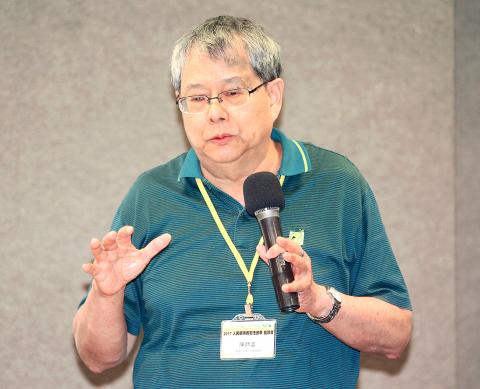A weekend conference on the nation’s judicial system attended by legal experts and representatives of civic groups heard concerns from several participants that the Presidential Office-led judicial reform effort is being derailed by entrenched forces inside the judiciary.
“Taiwanese do not trust the justice system because our nation still has not completed the ‘transitional justice’ process and is just in the starting stages of judicial reform,” Legal Aid Foundation secretary-general Chen Wei-shyang (陳為祥) said.
“In Japan and Germany, there is no crisis of distrust in their justice systems, and their citizens do not suspect court judges of taking bribes,” Chen said.

Photo: CNA
“However, we have a very serious problem of distrust in Taiwan,” he said.
The conference in Taipei was organized by the Friends of Beanstalk Association, the Ketagalan Institute, the Taiwan Forever Association and the Taiwan Jury Association and was supported by legal reform advocacy groups and other organizations.
Friends of Beanstalk Association chairman Chen Shi-meng (陳師孟), a former Democratic Progressive Party (DPP) member, said the government’s judicial reform efforts have lost their focus, as they overlook the real malaise plaguing the justice system.
Reforms have been derailed by judicial officials, most of whom are seeking to block reform to preserve their own privileged positions, Chen Shi-meng said.
“The people inside the judiciary are resisting the reform measures, and are attempting to retain the power and privilege they gained from the previous Chinese Nationalist Party (KMT) administrations,” he said.
The meetings being held by the preparatory committee for the National Congress on Judicial Reform should be talking about how to remove “dinosaur judges” and other unsuitable officials, such as prosecutors who do not do their job or use prosecution as a tool for political suppression, he said.
“The Legislative Yuan should amend the Judges Act (法官法) to place checks and balances on the justice system,” Chen Shi-meng said. “The Control Yuan should be proactive in impeaching judiciary officials found guilty of misconduct, negligence in their duty or criminal acts.”
A number of legal experts have called for implementing a jury system, but there has been resistance at several levels, as well as a debate over whether there should be 12-person juries like in the US or UK, or a more limited participatory jury system with only six jurors, whose decisions can be ignored by a judge.
“Throughout my career, I have seen too much injustice and misconduct in trials, and too often there have been miscarriages of justice. That is why I support the courts going with a jury system,” attorney Jerry Cheng (鄭文龍) said.
Openness and democracy are necessary for the judiciary, Cheng said.
Implementing a jury system is one of the ways to realize such openess because it would allow the public to participate in court rulings, he said.
Taiwan Jury System director Chang Ching (張靜), a former judge, said too many judges make rulings based on their personal biases or political leanings.
Jury systems have been successful in other countries and allow the judges to focus on trial procedures and application of the law, while leaving the judgements to the jury members, Chang said.
Additional reporting by staff writer

An essay competition jointly organized by a local writing society and a publisher affiliated with the Chinese Communist Party (CCP) might have contravened the Act Governing Relations Between the People of the Taiwan Area and the Mainland Area (臺灣地區與大陸地區人民關係條例), the Mainland Affairs Council (MAC) said on Thursday. “In this case, the partner organization is clearly an agency under the CCP’s Fujian Provincial Committee,” MAC Deputy Minister and spokesperson Liang Wen-chieh (梁文傑) said at a news briefing in Taipei. “It also involves bringing Taiwanese students to China with all-expenses-paid arrangements to attend award ceremonies and camps,” Liang said. Those two “characteristics” are typically sufficient

The brilliant blue waters, thick foliage and bucolic atmosphere on this seemingly idyllic archipelago deep in the Pacific Ocean belie the key role it now plays in a titanic geopolitical struggle. Palau is again on the front line as China, and the US and its allies prepare their forces in an intensifying contest for control over the Asia-Pacific region. The democratic nation of just 17,000 people hosts US-controlled airstrips and soon-to-be-completed radar installations that the US military describes as “critical” to monitoring vast swathes of water and airspace. It is also a key piece of the second island chain, a string of

A magnitude 5.9 earthquake that struck about 33km off the coast of Hualien City was the "main shock" in a series of quakes in the area, with aftershocks expected over the next three days, the Central Weather Administration (CWA) said yesterday. Prior to the magnitude 5.9 quake shaking most of Taiwan at 6:53pm yesterday, six other earthquakes stronger than a magnitude of 4, starting with a magnitude 5.5 quake at 6:09pm, occurred in the area. CWA Seismological Center Director Wu Chien-fu (吳健富) confirmed that the quakes were all part of the same series and that the magnitude 5.5 temblor was

The Central Weather Administration has issued a heat alert for southeastern Taiwan, warning of temperatures as high as 36°C today, while alerting some coastal areas of strong winds later in the day. Kaohsiung’s Neimen District (內門) and Pingtung County’s Neipu Township (內埔) are under an orange heat alert, which warns of temperatures as high as 36°C for three consecutive days, the CWA said, citing southwest winds. The heat would also extend to Tainan’s Nansi (楠西) and Yujing (玉井) districts, as well as Pingtung’s Gaoshu (高樹), Yanpu (鹽埔) and Majia (瑪家) townships, it said, forecasting highs of up to 36°C in those areas